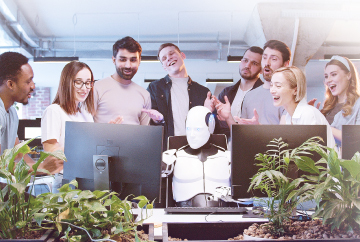Embracing Change and Sustainability
The manufacturing industry must adapt to the changing workforce, technology, and global landscape challenges. As a result, companies must foster a culture of continuous learning, innovation, and adaptability, prioritizing trust and employee well-being.
As the workforce becomes more diverse, companies must also ensure that their culture and policies are inclusive and provide equal opportunities for all employees. By embracing diversity and promoting inclusion, companies can tap into their employees’ unique skills, perspectives, and experiences, leading to improved innovation and performance.
As manufacturing undergoes a technological revolution characterized by adopting Manufacturing 5.0, automation, and digitalization, companies must invest in upskilling and reskilling their workforce to adapt to new technologies and processes to stay competitive. This requires fostering a continuous learning and innovation culture, where employees are encouraged to keep up-to-date with the latest industry trends and developments.
As the global market becomes increasingly interconnected, manufacturers face increasing competition, economic fluctuations, and regulatory pressures. Companies must develop strategies to navigate these challenges while maintaining sustainable practices considering environmental, social, and economic factors.
Companies should also prioritize confidence and employee well-being by providing supportive work environments, encouraging open communication, and offering resources for mental and physical health. A strong focus on employee well-being can improve productivity, retention, and company performance.
Finally, as shop floor employees reduce manual tasks and become machine managers using computers, operational technology, and information technology, their ability to work remotely will improve. That being said, envisaging a hybrid work model for shop floor employees can be challenging because of the nature of the work and the need for continuous production. Supervisors are already using phones to keep track of machine operations over multiple shifts, especially in process manufacturing and, more often, in discrete Manufacturing, where machine productivity requires 24/7 operation. Implementing periodic shifts for shop floor employees can help the manufacturing industry transition to a hybrid work culture.
Change Management, Done right.
As manufacturers begin to navigate these fundamental operational and workforce changes, there some basic guidelines that may help leaders adopt more enlightened workforce cultures.
Open Communication: The successful implementation of advanced technologies largely depends on the involvement of employees in change management. Therefore, organizations must focus on a culture of open communication. Shop floor employees are often the best source of information on productivity and quality improvements. Companies should encourage employees to share their thoughts, concerns, and ideas. This establishes a sense of ownership and commitment among the workforce. Based on research conducted by McKinsey, the likelihood of a successful transformation increases 5.8 times when CEOs convey a persuasive and overarching narrative of change. Furthermore, the chance of success rises 6.3 times when top executives disseminate consistent and unified messages about the change initiative.
Reward Cross-Skilling: Organizations must invest in training and reward skill development programs to equip their workforce with the knowledge and skills required to adapt to higher analytical skills driven by new technologies. This enhances employee capabilities and ensures a smooth transition to the new systems.
Leadership through Mentorship: Companies should also provide their employees with the necessary support and resources during the transition. This includes mentorship, guidance, and the availability of resources to address any challenges or issues that may arise.
Internal Communication: Organizations must emphasize adapting to new technologies and their potential benefits as part of their internal communications strategies. This can be achieved through awareness campaigns, workshops, and presentations highlighting the value these technologies bring to the organization regarding efficiency, productivity, and safety.
A study conducted by the
Boston Consulting Group found that organizations that successfully implemented change initiatives like these were 3.5 times more likely to effectively communicate the benefits of change to their employees, resulting in increased employee buy-in and support for the changes.
A study conducted by the Boston Consulting Group found that organizations that successfully implemented change initiatives like these were 3.5 times more likely to effectively communicate the benefits of change to their employees, resulting in increased employee buy-in and support for the changes.
Attracting a Younger Workforce
The younger generation, often called millennials and Gen Z, tends to prioritize working for companies and non-profits that have a clear, positive impact on society. To appeal to this demographic, manufacturers must communicate their mission and culture effectively, emphasizing how their products contribute to the greater good.
A strong mission statement that reflects the company’s core values and goals can resonate with younger employees, who are often driven by a sense of purpose in their work. This generation seeks to make a difference, and by aligning the company’s mission with societal benefits, manufacturers can create a more attractive workplace for young professionals.
A company’s culture is the set of shared values, beliefs, and practices that shape the work environment. A positive, inclusive, and empowering culture can be a significant draw for younger employees who prioritize work-life balance and personal development. In addition, manufacturers can improve employee satisfaction and engagement by promoting a healthy work culture.
Younger employees are often passionate about environmental sustainability and may be more inclined to work for companies committed to reducing their ecological footprint.
Manufacturers can appeal to these values by adopting eco-friendly practices, investing in green technologies, and promoting transparency around their sustainability initiatives.
The younger workforce is also attracted to companies that take an active role in addressing social issues and contributing to the communities in which they operate. Manufacturers can showcase their commitment to social responsibility by engaging in philanthropy, volunteer programs, and community partnerships. These initiatives help attract and retain young talent and enhance the company’s reputation and brand image.
